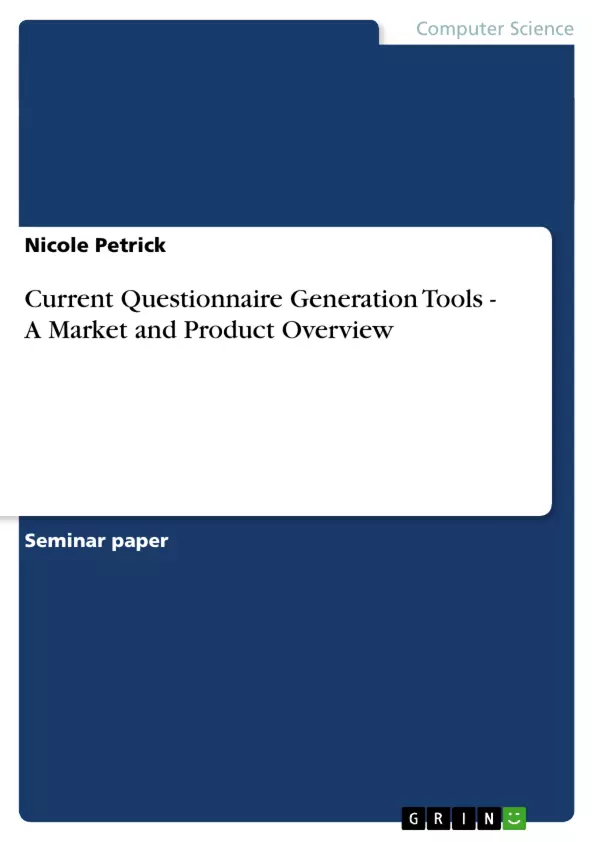The paper mainly focuses on current questionnaire generation tools on the German-speaking market. Additionally, an introduction to internet-based research is given in Part One of this paper that will explain the differences between online surveys and online experiments and the choices of when and when not to conduct an experiment on the internet. It will also shortly introduce advantages and disadvantages of online research as well as the current standards that have been derived so far.
Part Two of the paper gives a short market analysis on the market of questionnaire generation tools with its suppliers and demanders, explaining the past and current development of the market as well as its future trend.
The main focus lies on the product analysis in Part Three. Comparative features that will be looked upon when analyzing different products will be derived from the standards, introduced in Part One of this paper. A choice of current suppliers and their products will be represented and the positioning of their products within the market explained. Two favored products are then compared in more detail according to features, usability and pricing scheme, presenting a short result from the comparison thereafter.
A summary will be given at the end that will recapitulate the results from the paper.
Inhaltsverzeichnis (Table of Contents)
- I. INTRODUCTION.
- II. INTERNET-BASED RESEARCH - AN INTRODUCTION ...
- INTERNET-BASED RESEARCH PROJECTS
- i. Online Surveys.
- ii. Online Experiments.
- THE CHOICE OF WHEN TO CONDUCT AN EXPERIMENT ONLINE.
- ADVANTAGES AND DISADVANTAGES OF ONLINE RESEARCH
- STANDARDS FOR ONLINE RESEARCH
- INTERNET-BASED RESEARCH PROJECTS
- III. MARKET ANALYSIS……………………………………………
- PAST MARKET DEVELOPMENT
- CURRENT MARKET STATE
- i. Supply side......
- ii. Demand side..\li>
- TRENDS..
- IV. PRODUCT ANALYSIS …………………………………………………………………………………………
- COMPARATIVE FEATURES..
- CURRENT SUPPLIERS AND THEIR PRODUCTS
- ANALYZING PERFORMANCE VIA SCORE POINTS..
- PRODUCT POSITIONING..
- GLOBALPARK VERSUS ASK4MORE - A COMPARISON.
- a. Features...
- b. Usability.......
- c. Pricing scheme.
- d. Outcome....
- V. SUMMARY.
Zielsetzung und Themenschwerpunkte (Objectives and Key Themes)
This paper provides a comprehensive overview of current questionnaire generation tools available on the German-speaking market. The research focuses on online survey tools and their impact on internet-based research, encompassing both market analysis and product analysis. This includes a comparative analysis of features, usability, and pricing schemes of leading software solutions.
- Online Research Methods and their Applications
- Market Analysis of Questionnaire Generation Tools
- Comparative Product Analysis
- Evaluation of Key Features and Usability
- Pricing Strategies and Market Positioning
Zusammenfassung der Kapitel (Chapter Summaries)
The paper is divided into five sections. The introduction provides a brief overview of the topic. The second section delves into internet-based research, explaining the differences between online surveys and experiments, highlighting advantages and disadvantages of online research, and outlining established standards for online research. The third section focuses on the market analysis, examining the past development of the questionnaire generation tools market, including supply and demand dynamics, and analyzing current trends.
The fourth section explores product analysis. It outlines comparative features, examines current suppliers and their products, analyzes performance using a scoring system, and presents a detailed comparison of two leading products, Globalpark and ask4more, based on features, usability, pricing schemes, and overall outcomes.
The final section provides a summary of the findings, recapping the key insights from the paper.
Schlüsselwörter (Keywords)
This research paper focuses on questionnaire generation tools, online surveys, internet-based research, market analysis, product analysis, comparative analysis, features, usability, pricing schemes, and market positioning.
Frequently Asked Questions
What is the main focus of this market overview?
The paper focuses on current questionnaire generation tools available on the German-speaking market, providing a product and market analysis.
What is the difference between online surveys and online experiments?
The paper explains the methodological differences between surveys and experiments in internet-based research and provides criteria for when to choose an experiment.
Which products are compared in detail?
A detailed comparison is conducted between the two leading products Globalpark and ask4more, focusing on features, usability, and pricing.
What are the advantages of online research mentioned?
The paper outlines the benefits and drawbacks of internet-based research and introduces current standards derived for this field.
How is the performance of the tools analyzed?
The performance is evaluated using a scoring system based on comparative features derived from online research standards.
- Quote paper
- Nicole Petrick (Author), 2006, Current Questionnaire Generation Tools - A Market and Product Overview, Munich, GRIN Verlag, https://www.grin.com/document/73652



